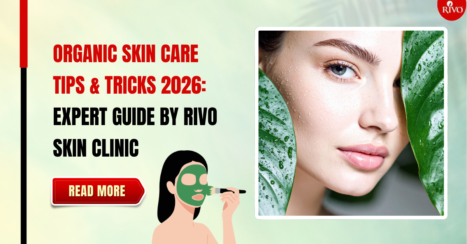Rivo Skin Clinic Your experts on Skin Health in Mumbai
Face care products have evolved tremendously over the years, and Face Serum has become one of the most popular additions to women’s skincare routines. Lightweight, concentrated, and packed with active ingredients, face serums promise glowing, youthful skin. However, like all the other beauty products, we have one common question amongst many- “are they safe, or will they harm our skin?”
In this blog, we will explore what a Face Serum is, how it works, its possible side effects, and how to choose the right one for your skin type. Afterward, you would be sure of how to go about serums without harming your skin.
What is a Face Serum?
A Face Serum is a lightweight skincare product designed to deliver high concentrations of active ingredients directly into the skin. Serums work in the opposite way because they are smaller as compared to creams or lotions, meaning that they penetrate deeper into the skin layers to deliver faster and more efficient results.
Common Active Ingredients Found in Face Serums:
Ingredient | Primary Benefit |
Hyaluronic Acid | Deep hydration and plumping |
Vitamin C | Brightening and antioxidant protection |
Retinol | Anti-aging and wrinkle reduction |
Niacinamide | Improves skin texture and reduces inflammation |
Peptides | Boost collagen production |
Although these ingredients create incredible effects in skincare, taking the incorrect concentration or type on your skin may harm you or create an irritation.
Why People Love Face Serums
The popularity of Face Serum products is due to their targeted action. Whereas a moisturiser helps in moisturising the skin superficially, serum goes deep into the skin to target certain skin concerns such as pigmentation, fine lines, acne scars or dullness.
Some reasons why women prefer face serums:
- Fast noticeable outcomes
- Non-greasy lightweight feel
- It would work well in combination with other skincare products
- Tailor made solutions to skin specific issues
Can a Face Serum Be Harmful?
While Face Serum is generally safe, certain factors can make it harmful if used incorrectly. The following is what you must put in mind:
- Bad Ingredient to Your Skin Type
Not all serums can fit all skin types. An example is that a serum that is highly loaded with retinol may be too rough to the sensitive skin and could lead to redness or peeling of skin or acne.
- Excessive usage of Active Ingredients
Overuse of serums (using them too frequently, or layering several with active ingredients such as AHAs, BHAs, and retinol) may interrupt your skin barrier. This may cause dryness, inflammation and sensitivity.
- Quality products or products that are out of date
Cheap serums can possess bad fillers, fragrances, or alcohols which give skin irritation. Bacterial infections are also caused by expired products.
- Allergic Reactions
There is the possibility that some people have allergies to botanical extracts or chemicals of the serums. You should always test a bit of it out first on a patch test before you put it on your whole face.
Signs Your Face Serum is Damaging Your Skin
Although a serum can be a potent acquisition to your skincare routine, it is necessary to be mindful of the way your skin behaves. One formula does not fit all skin types and in some instances ingredients or a set of ingredients can cause negative skin reactions. When you introduce a new serum, you may want to watch out for some of the following signs that indicate that it might be less helpful than it is harmful:
- Redness or irritation that do not go away even after a while – A flushed skin or an itchy one after several hours of applying the product may imply that the integrity of your skin barrier is being interfered with or that the product is too potent on your skin.
- Numbness of itching or burning sensation – Stinging is normal on some active ingredients but you should contact your doctor when you get the feeling of itching or burning persistently as your skin is allergic to an ingredient.
- More breakouts – There are certain formula particularly formulas containing heavy oils or clogging pores ingredients which may cause acne flare up. In case you spot additional pimples with the utilization of the product, it would be better to rethink the medication.
- Dryness or flakiness that is too extreme – Other products rather than providing more hydration will remove the existing oils because the product may cause tightening, peeling, or be rough.
- Edema or rash – An allergic rash, bumps or even noticeable swelling indicates clearly that the product is harming your skin and as such should be abandoned forthwith.
Attending to some of these red flags can preserve your skin without the long-term damage. Should you experience any of them, discard the use of the products and go to a dermatologist to determine the specific cause.
How to Use a Face Serum Safely
Using a Face Serum the right way can maximize benefits and minimize risks. Here are tips:
Step | Action |
1 | Cleanse your face with a gentle face wash. |
2 | Apply toner (optional) to balance pH. |
3 | Use 2–3 drops of serum, spreading evenly. |
4 | Wait 1–2 minutes for absorption. |
5 | Seal with moisturizer to lock in hydration. |
6 | Apply sunscreen in the morning. |
Pro Tip: Introduce with a serum one a day and ideally at night, work up the frequency in time depending on how well your skin can accept it.
Choosing the Right Face Serum for Your Skin Type
In Oily Skin
When your skin tends to feel greasy and appears shiny only several hours after a cleanse, use lightweight fast absorbing oil-free serums. Such ingredients as niacinamide may help to control sebum production, and salicylic acid will exfoliate within the pores to ease the possibility of breakouts due to clogged pores. This is where water-based serum is your best friend since it does not clog pores but rather hydrates.
In Dry Skin
Dry skin tends to be tight or rough to touch or even appear dull due to the lack of water content. Here, you require serums that have plenty of hydrating and moisture sealants. Ask to see hyaluronic acid to pull water into the skin and glycerin to hold it, and ceramides to fortify your skin barrier. A bit thicker, creamier serum may come in handy, and it can be used in colder or drier weather.
To Sensitive Skin
Irritants may not be much, but your sensitive skin may develop skin sensitivity so opting non-irritating ingredients or soothing serums is advisable. Other soothing botanicals containing aloe vera, chamomile extract and centella asiatica calm and minimize the redness and discomfort. Skip anything that includes high levels of acids, alcohol or a synthetic fragrance as these will result in a flare-up. Always do a patch-test then apply to complete your face.
On Aging or Mature Skin
Naturally, as skin gets older, it also loses its collagen and elasticity resulting in uneven tone, wrinkles and fine line. Look for retinol (to boost cell turnover), peptides (to stimulate collagen production), and Vitamin C (to brighten and fight free radical damage). These serums are useful to eliminate wrinkles, tighten the skin, and make a person look young again.
Pro Tip: Consistency is No. 1, no matter whether you have sensitive or normal skin. The correct serum applied on a regular basis will eventually improve your skin, but wrong formulas will regress you. Never stop listening to what your skin says and react to it.
The expert opinion will be what Rivo Skin Clinic can recommend.
At Rivo Skin Clinic, we believe that Face Serum should be personalized based on your skin type, lifestyle, and specific concerns. The mild form of serums, especially hydrating serums, is what our dermatologists frequently prescribe first in the case of stronger formulas. We also emphasize the importance of wearing sunscreen every day, because most serums may increase damaged skin to UV exposure.
The Verdict – Are Face Serums Harmful?
The answer is no-if you pick the correct one and you use it properly. When tailored to your skin’s needs, Face Serum can be one of the most effective tools in your skincare routine. The problem can occur, however, with misuse or bad-quality products.
FAQs on Serums
Most serums are good to be used daily; however, you need to take it easy at first and give your skin time to adjust to using serums.
Serum must be used before moisturizer.
Serums are not meant to replace a moisturizer, actually, they should be applied under one.
Depending on the person everything is different, but most people will notice a difference in 4-6 weeks.
Yes, but provided that when combined they do not give rise to irritation on account of their ingredients.
Do not put anything with retinol or strong acids in the skin during pregnancy-so perhaps you should talk to your dermatologist before using it.
Follow us At Rivo Skin Clinic
Ready to find the perfect Face Serum for your skin? Come to Rivo Skin Clinic and seek professional advice of our established dermatologists.
Locations: Mumbai & Navi Mumbai
Phone Us: +91 9833431663 / 9850661962






